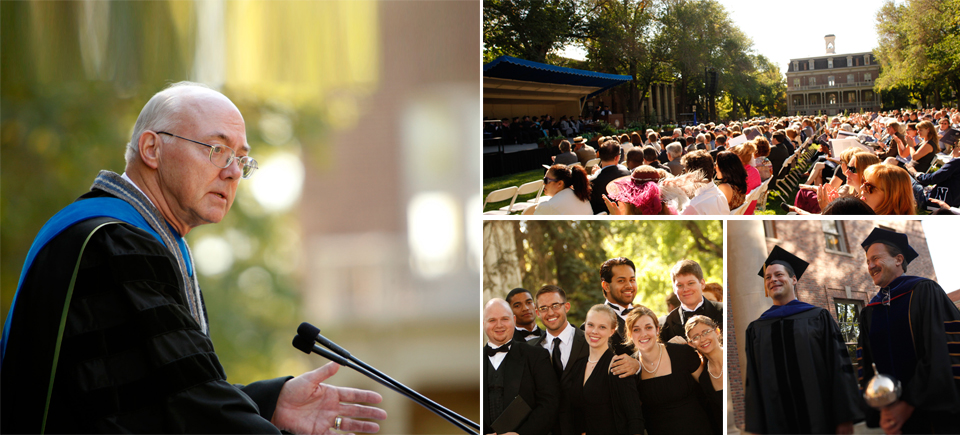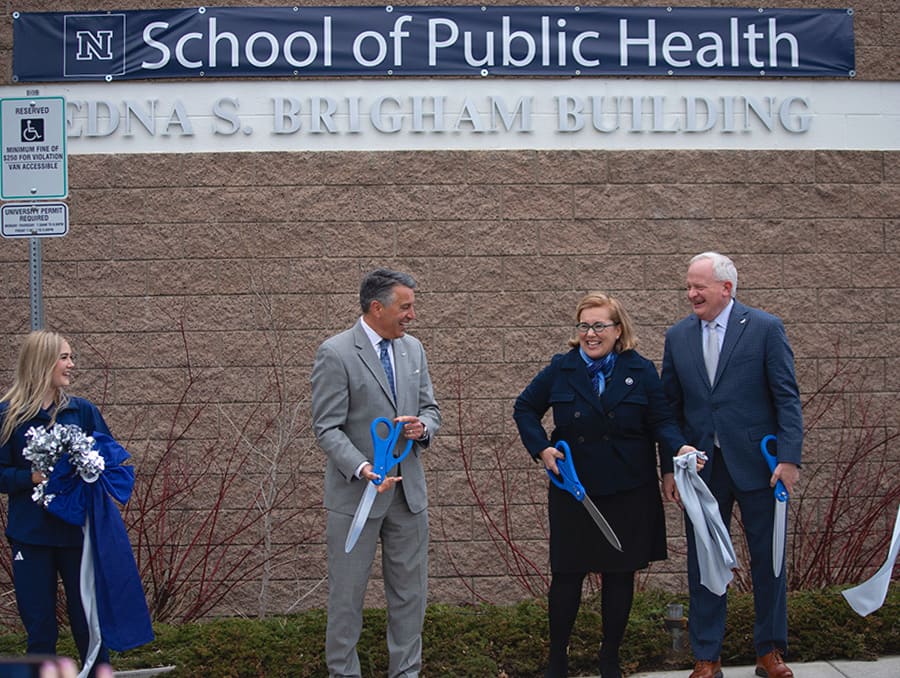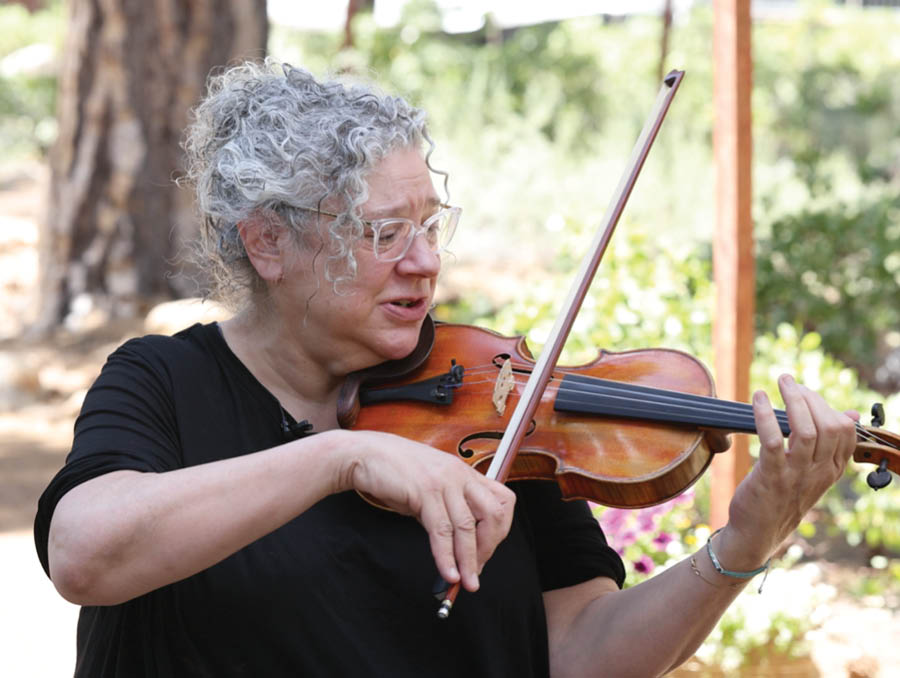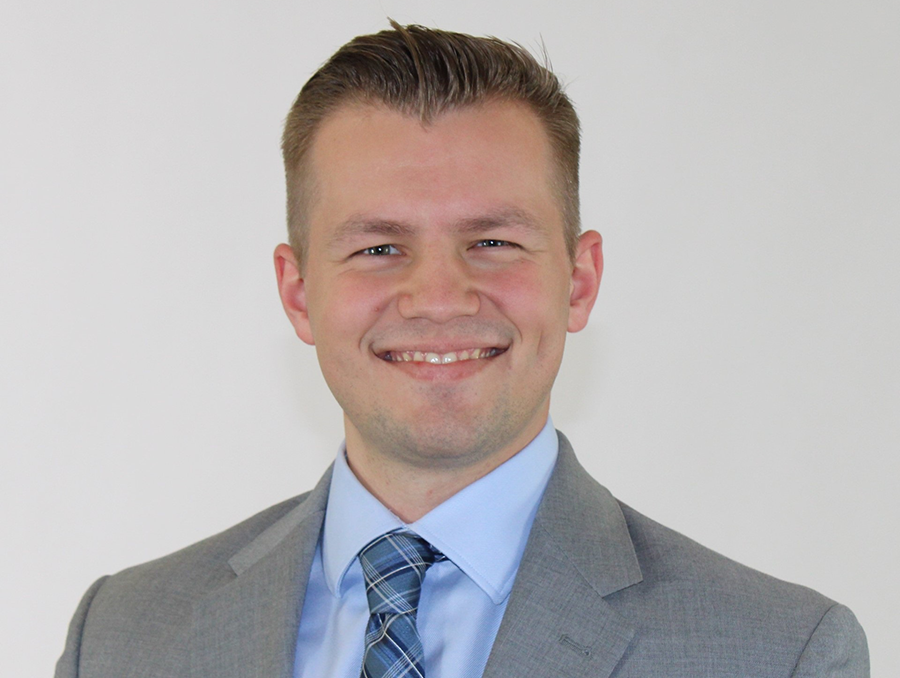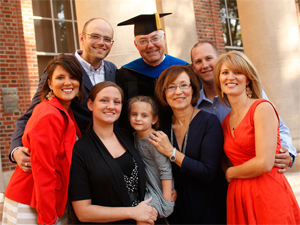
President Marc Johnson celebrates during the inauguration with his wife, Karen Penner-Johnson, and family.
Read the Address
Marc Johnson was inaugurated as the 16 th president of the University of Nevada, Reno on Friday on the University Quadrangle, promising that the institution would grow "an even higher quality University experience."
"As we have seen at this University over the past several years, when people choose to contribute, to plan and work together, to dream and hope together, the results are amazing," Johnson said during a 23-minute inaugural address that capped a warm morning on the Quad before a crowd of more than 500. "As we move forward, it is our institutional pride and abiding sense of teamwork that excites me."
Johnson then added, "I promise to make you proud - proud of this University, and proud of all the people who make our University so special."
Johnson, who had served as provost and executive vice president of the University from 2008-2011, assumed the position of interim president following the death of Milton Glick in April 2011.
One year later, in April 2012 following a national search, Johnson was appointed permanent president by the Board of the Regents of the Nevada System of Higher Education.
Connecting with the University's heritage
Johnson's remarks on Friday harkened to the University's past, and also spoke to the future. Johnson said it was important to stress both, noting that the inaugural ceremony was as much about the University, its people, and its culture of achievement, and not necessarily about him.
Early in his remarks, Johnson paid homage to past University presidents Joe Crowley, John Lilley and Glick. Crowley and Lilley were among those in Friday's platform party, which also included Nevada System of Higher Education Chancellor Dan Klaich, and Board of Regents Chair Jason Geddes.
"Their imprint on this institution has been indelible," Johnson said of the University's 13 th through 15 th presidents. "Their legacy, even today, influences all that we do."
Johnson said from such leadership, the University had become what it is today: "the people's University," noting that in addition to providing an education for all qualified Nevadans through its Land Grant roots, the University's heritage had been based on "mutual respect, collaboration, and understanding."
"We must continue to stress personal, human interaction between students and experienced mentors if we are to remain true to our heritage of this University and to foster critical thinking and discernment," Johnson said.
The University's heritage of meaningful human interaction, and several of Johnson's own personal qualities, were on the minds of several of the speakers who preceded Johnson on Friday.
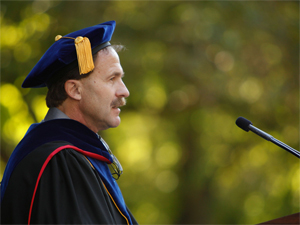
David Zeh, chair of the Faculty Senate, served as master of ceremonies during the inauguration.
A tested individual
Faculty Senate Chair David Zeh, who also served as master of ceremonies, said that over the past two years, first as Faculty Senate chair-elect and now as Senate chair, he had come to know "and to greatly admire Marc Johnson as a thoughtful, determined, and courageous leader of this fine institution."
Zeh, who also serves as chair of the Department of Biology and is one of the campus' most respected teachers and researchers, said that "it is the best of times, and it is the worst of times for higher education. An educational model that has stood the test of time, that has served to make this country a Mecca for scholarship, innovative research and educational excellence, is being challenged."
He said against such a backdrop, he believed Johnson was ready to lead the University.
"As interim president of this University, Marc Johnson has faced his share of both challenge and controversy, and he guided this ship through the troubled waters of the most extreme budget-cutting episode in the history of this institution," Zeh said. "Marc's strong character and his able leadership in these trying times earned him the respect and admiration of our faculty, and we look to the future with great optimism and enthusiasm. It is now Marc Johnson's time to shine."
Erik Williams, past chair of the Staff Employees' Council, echoed Zeh's assessment of Johnson.
Even during a time of layoffs, furloughs and diminished resources, Williams said Johnson, in all of the interactions between the two, "was always able to convey the nature of the issues and explain what had caused the cuts, what he could and could not do about them, and most importantly - truly and honestly empathize with us."
Williams, drawing good-natured laughter from the audience, said that a comment Johnson made during the search process for president pretty well summed up the lanky, soft-spoken native of Kansas.
"'I'm not very flashy, but I wear well,'" Williams said with a grin. "That comment has stuck in my mind ever since he said it. ... Yes, I would say he does wear extremely well."
Williams later added of Johnson, "If he's this good during the worst of times, just imagine what he will be like in the best of times."
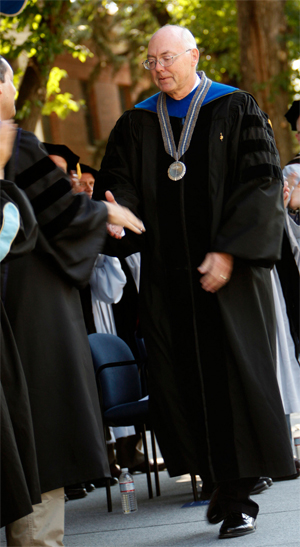
Marc Johnson shakes hands with the platform party as he walks to the lectern.
Orion Cuffe, the president of the Graduate Student Association, noted the commonly held stereotype that most economists can be distant and cold and statistically-driven. He said that Johnson, was in fact, a trained economist, but that after working closely with Johnson on student issues, it was apparent to the Ph.D. candidate in economics, that Johnson's "personal warmth, and his integrity" were the president's greatest strengths.
"I can tell you confidently after working with him ... he is not a true economist," Cuffe said with a smile.
Board of Regents Chair Geddes, in his remarks, said that Johnson had "helped the campus heal" during a time of tragedy. Johnson also, Geddes said, "just as importantly reminded the institution that all universities have only one path to follow if they are to attain greatness: They must constantly move forward. It was a delicate operation, to honor the past while looking to the future, but Marc pulled it off with great success."
A critical time for higher education
During his remarks, Johnson said critical thinking and discernment were two skills greatly needed at the moment, not only at the University, but for the world to help resolve conflict.
"The best remedy for ignorance is knowledge and understanding," Johnson said, recalling events earlier this month when American diplomats were murdered in Libya. "Education always has been the most reliable pathway for them.
"Our value as an institution, in this volatile, uncertain world, has never been greater."
Johnson spoke of time spent early in his teaching career in international economic development, when he traveled to Pakistan, for a grain storage project.
"I saw a country of stark contrasts," Johnson said. "On the high ridges of the cities were nice homes, where the wealthier, educated class of the country lived in relative prosperity. Beneath the ridges of opportunity, in the deep gullies, were the homeless or the nearly homeless, those without electricity or water, those who had never experienced the benefit of an education.
"I thought to myself that the people living in those gullies had a long struggle ahead if they were ever going to climb up and reach the ridges of prosperity. And some did. Education was the answer then, and it's the answer now."
Fulfilling two missions
Johnson said the University is uniquely positioned, in the dual roles of the state's Land Grant University and as a "statewide, liberal arts and sciences University," to "immerse our students in today's global challenges and to help them think accurately, discern clearly, the paths they wish to follow if they are to lead future generations."
He said he learned much when he was charged by Glick, in 2008, to gather information, to listen to various core campus constituencies, and to develop and write the University's Institutional Strategic Plan.
"It was an often exhilarating, sometimes arduous, but always memorable experience as I met with scores of University groups," Johnson said. "I came away with two thoughts. One, I realized I'd better write fast, because the clock was ticking on submitting our plan to the Board of Regents.
"Two was how passionate and how proud of our University our people were."
He said the University's strategic plan and its roadmap for moving forward "speaks to those passions, to our institutional strengths, and to our responsibilities to the State of Nevada."
Among the commitments contained in the plan, Johnson mentioned the University's broad range of degree programs, the University's growing record enrollments and graduation rates, the campus' increasing diversity, and the quality of the student body as a whole.
"We've not only transformed the quality of our institution in this way, we've improved Nevada's image nationally," he said.
Remaining challenges to fulfill
Johnson also cited the University's growing and nationally competitive research portfolio, the institution's contributions to northern Nevada's quality of life and economic diversification, key partnerships forged with K-12 and Nevada System community colleges to "build aspirations and clearer pathways for Nevada youth to attain the highest possible level of education for each individual," the development of a healthcare workforce of trained doctors and nurses and professionals, and the University's role as a regional leader in keeping Lake Tahoe blue and protecting the Great Basin ecosystem.
Johnson admitted, however, that although "these commitments are firm" there were still "challenges to fulfill."
He cited "the affordability dilemma" of higher education in the form of increasing tuitions and fees, diminishing state budgets in support of higher education, and, on the federal level, "a more competitive federal research environment."
"These challenges must be met with adoption of a true entrepreneurial spirit, critical decisions about directions for growth, and public education about the public returns to higher education investments," he said.
Johnson also said higher education continues to face "substantial pressure to increase the quantity of graduates with few new resources."
He said the University would be able to face this challenge because of its strongest commodity: Its people.
"Our administration, our college leaders, our faculty and staff leaders, our student leaders, all have committed themselves to the mission of growing an even higher quality University experience," Johnson said, noting how the campus' residential experience has been transformed, how faculty and students work so well together through "experiential, hands-on" learning and how staff, "on a daily basis ... makes this a beautiful, operational University."
Johnson also said he would continue to see that the University builds bridges into the community it serves.
"It is my intention to ensure that the barrier lines between our community and this campus will continue to fade," he said.
As he concluded, standing in the shade of the platform, staring out at a sun-splashed audience, under a cloudless sky that was blue enough to pass for a University banner, Johnson said it was his plan to "honor each and every person who believes in, or is influenced by, this University's important mission."
"I promise to pursue a course rooted in the decency, strength of spirit, and unbounded potential for knowledge that has characterized this institution since our founding in 1874," Johnson said.
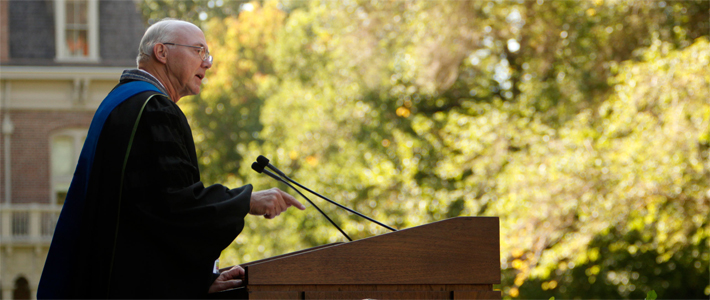
Marc Johnson delivers his inaugural address on the Historic Quad.
